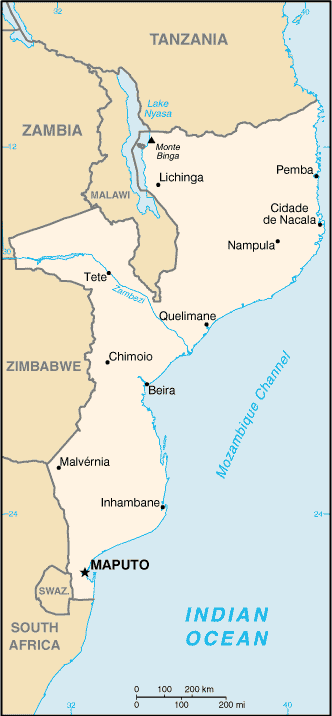Mozambique lies on the eastern coastline of southern Africa, across the channel from the large island of Madagascar. It was a Portuguese colony until 1975. The Africans gained independence after a ten-year civil war waged by guerrilla freedom fighters. During the struggle for independence, the liberation movement was aided by the former Soviet Union and became enamored with Marxist-Socialist ideology. Upon gaining control of the country they sought to make Mozambique the first fully Marxist Republic state in all of Africa.

The sudden imposition of Marxist economic principles, the exodus of all Portuguese settlers representing nearly the entire educated and skilled labor force of the country, an ongoing civil war that continued until 1992, multiple natural disasters, and self-sacrificing opposition to the colonial regimes of border countries all combined to make Mozambique the poorest nation on earth and the country of highest human suffering in the world.
In 1992, the government terminated its failed experiment in Marxism. It adopted a new democratic constitution; instituted free market economic principles; made peace with its internal enemies, accepting them as a legitimate opposition party functioning freely under democratic regulations; and enjoyed good relations with its surrounding neighbors, all of whom had become independent African nations free from colonial or minority rule. With these changes, Mozambique became one of the most rapidly advancing countries in Africa with one of the strongest economies. Opposition to Christianity had died out by 1992. Today the country enjoys religious liberty, freedom of speech, and freedom to assemble.
Nampula
Nampula is the third largest city of Mozambique and the cultural and economic hub of the northern half of the country. Over 405,000 people live in the city, with an additional 450,000 people in the surrounding rural areas. It is the capital of the most populous province of the country with 4.3 million people.
Religion
The predominant religion of Mozambique is animism, the traditional African religion that believes the spirits of departed ancestors actively influence the affairs of the living. Spiritual activity is almost always detrimental, and hostile spirits must be placated by ceremonies and sacrifices. The witch doctor plays a prominent role in culture. Most Muslims, Catholics, and professing Protestants are practical animists, resorting to the witch doctor and pagan customs when circumstances require it.
